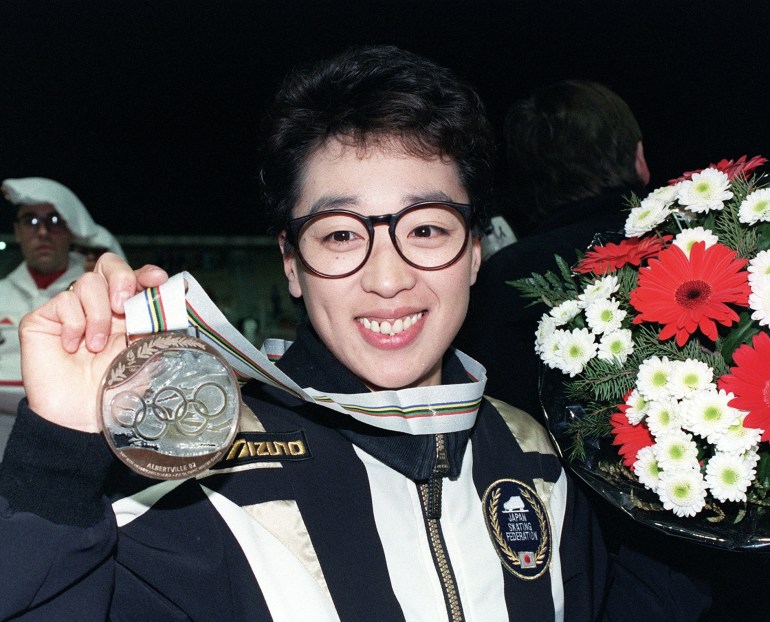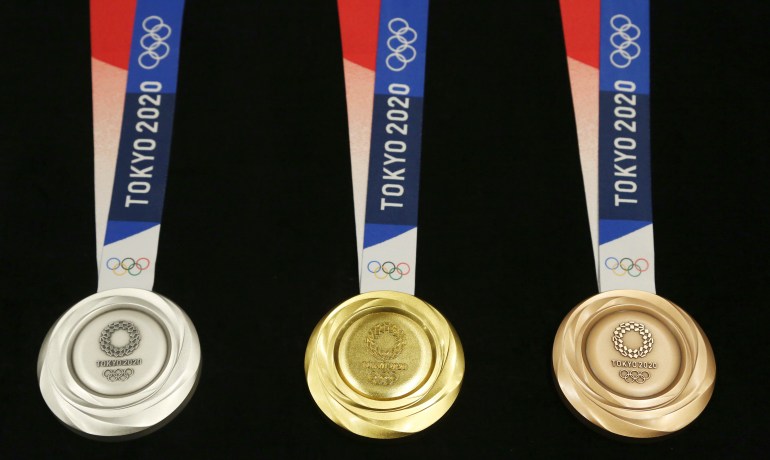Tokyo’s marathon journey to the start of the Olympics
Since being awarded the Games in 2013, Japan has endured a backlash over costs, allegations of plagiarism and misogyny and a COVID-19 pandemic.

A year after they were supposed to start, the Tokyo Olympics will officially get underway with a three-and-a-half-hour opening ceremony on July 23.
The event at the National Stadium in the Japanese capital is designed to celebrate the world’s “unity in diversity” and provide encouragement to the more than 11,000 athletes who will compete in the Games, mostly without the benefit of crowds to cheer them on.
Keep reading
list of 4 itemsFirst event of troubled Tokyo Olympics gets under way
Ugandan athlete who fled Olympics camp found in central Japan
South Korea’s Moon cancels Japan trip amid spat over insult
After a journey across Japan’s 47 prefectures involving some 10,000 runners, the Olympic flame will be the centrepiece of the ceremony.
“Our goal is to deliver a performance of human affirmation and hope for the future,” said Director of Choreography Shintaro Hirahara.
The Tokyo Olympics have emerged as one of the most controversial sporting events in recent years, buffeted by a series of scandals over issues including sexism, bullying and whether the Games should even go ahead during a global pandemic.
Tokyo itself is under a coronavirus state of emergency and competitors and the Games staff have been confined largely to the Olympic Village, training centres and sports venues. Even the medal ceremony has been modified because of the virus and athletes will have to pick up their medal themselves to hang around their necks.
The Games have been billed as the most “innovative” ever and have been designed to appeal to younger people with karate, 3×3 basketball, skateboarding, climbing and surfing all making their Olympic debut.
Baseball and softball have also returned to the competition for the first time since the 2008 Games in Beijing.

Here is a timeline of the Tokyo Games’ stuttering progress to the starting line.
Sept 2013
At a ceremony in Argentina, the IOC awarded the 2020 Games to Tokyo, beating out Madrid and Istanbul.
Then IOC President Jacques Rogge said Tokyo had promised to deliver “a well-organised and safe Games that will reinforce the Olympic values while demonstrating the benefits of sport to a new generation.”
The Japanese capital previously hosted the Summer Games in 1964.

July 2015
Japanese Prime Minister Shinzo Abe shelves plans for a new national stadium by renowned British architect Zaha Hadid after the cost of the project ballooned to more than $2bn.
“We have decided to go back to the start on the stadium plan and start over from zero,” he told a news conference.
April 2016
Organisers unveil a new logo for the event after accusations of plagiarism forced them to drop the initial design.
The indigo-chequered design of Tokyo-based Asao Tokolo is inspired by an Edo-era (1603 – 1867) pattern known as “ichimatsu moyo” and is supposed to represent “Unity in Diversity”.

August 2016
Abe, wearing a hat similar to the one worn by the video game character Super Mario, formally takes over the Olympic baton at the end of the 2016 Summer Games in Rio de Janeiro.

February 2018
Organisers unveil the Summer Games’ two mascots – Miraitowa and Someity – which thousands of primary schoolchildren had picked in a vote. The anime-style creatures – one blue and one pink – were created by Fukuoka-based illustrator Ryo Taniguchi and are supposed to symbolise tradition and innovation.
“The mascots exist in unison, a yin-yang pair along a Tokyo theme, ‘old meets new’,” the organisers said.
October 2019
The IOC decides to move the marathon event to the cooler climes of northern Sapporo to escape Tokyo’s oppressive heat and humidity.

December 2019
The first cases of a mysterious pneumonia are reported in Wuhan in central China.
Despite the early hurdles, the construction of the new National Stadium is completed on schedule.
The building is the work of renowned Japanese architect Kengo Kuma.

March 2020
As the pneumonia, now attributed to a new coronavirus, spreads around the world, the World Health Organization declares a pandemic.
On March 20, the Olympic flame, carried on board a special aeroplane from Athens, arrives in Japan.
Four days later, Prime Minister Shinzo Abe and President of the International Olympic Committee Thomas Bach announce an unprecedented delay to the Olympics. Abe said they would be held by the summer of 2021 and would be “proof of a victory by human beings against the coronavirus infections”.
September 2020
Abe resigns blaming ill-health. His longtime Chief Cabinet Secretary, Yoshihide Suga replaces him.
January 2021
COVID-19 cases surge in Tokyo, prompting the declaration of a state of emergency. Opposition to hosting the Olympics begins to grow in Japan.
February 2021
The organisers release their first set of COVID-19 rules for the Games. Singing and dancing will be banned and masks will have to be worn at all times, according to the Playbook.
Tokyo 2020 chief Yoshiro Mori is forced to resign over sexist comments about women that triggered an outcry both at home and abroad. “My inappropriate comments caused a lot of chaos,” he said as he stepped down.
Olympic Minister Seiko Hashimoto, a seven-time Olympian, takes the place of the 83-year-old former prime minister.

March 2021
Foreign spectators are banned from the event.
The Olympic torch relay begins in Fukushima, the area devastated by the triple earthquake, tsunami and nuclear meltdown 10 years before. Azusa Iwashimizu, a member of Japan’s 2011 Women’s World Cup winning team, becomes the first to carry the flame in a ceremony closed off to the public.
April 2021
North Korea says it will not take part in the Games because of the coronavirus risks.
June 2021
Australia’s women’s softball team become the first athletes to arrive in Japan.
Organisers put a limit on the number of domestic fans allowed to attend each event – half the capacity of the venue to a maximum of 10,000 people.

July 2021
Tokyo announces a new state of emergency on July 8 and bans all spectators from Olympic competitions in the area.
Opinion polls continue to show more Japanese oppose the Games than support them.

The first athletes move into the Olympic Village at Harumi waterfront and soon after, the first case of COVID-19 emerges.
Keigo Oyamada, the Japanese musician tapped as the composer for the opening ceremony, is forced to step down four days ahead of the event, after historic allegations of bullying and abuse resurface.

Japan wins the first event of the Tokyo Olympics – a women’s softball match against Australia – on July 21.
On the eve of the opening ceremony Show Director Kentaro Kobayashi is forced to quit after footage of the former comedian joking about the Holocaust resurfaces.